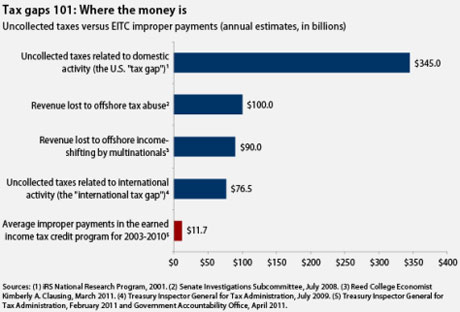
In a hearing this morning, the House Ways and Means Committee examined “improper payments” made in the Earned Income Tax Credit program, which distributed $64 billion in refundable tax credits last year to low-income families during the worst recession in 70 years. “Refundable tax credits not only reduce an individual's tax liability, they can also result in payments from the government when the credits exceed one's tax liability; meaning that millions of Americans have been able to eliminate any income tax liability and even get a check back from the government via refundable credits,” said oversight subcommittee chairman Charles Boustany (R-Louisiana).
So instead of going after tax scofflaws that effectively rob the national treasury of hundreds of billions a year, House Republicans have decided to target one of the country's largest anti-poverty programs, one that Ronald Reagan called “the best antipoverty, the best pro-family, the best job creation measure to come out of Congress.”
Of course, the IRS and Congress must be vigilant about all errors — and some overpayments undeniably occur with the EITC — but policymakers who are serious about reducing the deficit could focus on far larger examples of waste in our federal tax system. For example, the government loses $100 billion every year in revenue to offshore tax havens. It loses another $90 billion when multinational corporations shift their profits out of the country. While low- and middle-income families sacrifice to pay their share, dozens of profitable US corporations like Exxon Mobil and Boeing manipulate loopholes to dodge federal taxes altogether.

As the Center on Budget and Policy Priorities noted, charges of overpayments in the EITC are likely overblown anyway:
First, the commonly cited EITC error rate — 23 to 28 percent of EITC payments are said to represent overpayments — is likely to overstate the actual level of overpayments (although the overpayment level is clearly substantial). This is true for several reasons. First, as explained below, the 23 percent to 28 percent figure is based on IRS studies of tax data from 2001 and 2006 that suffer from some significant methodological problems. (The IRS is scheduled to complete and issue a new study of EITC overpayments in 2012, although the key methodological problem will remain.) Second, as also described below, the IRS has instituted various new enforcement actions and error-reduction techniques in the last several years that may be helping to reduce overpayments.
House Republicans — who have voted time and again to both protect tax loopholes for companies that ship jobs offshore and to preserve billions in federal payments to, among others, Big Oil companies — seem to only find it worrisome when a poor family has no federal tax bill (while, of course, paying their fair share of state and local taxes). Multinational corporations, meanwhile, can pay as little as they please, free from criticism.
<!— post updates would go here in theory —><!— end #entryContent —>
Join us in defending the truth before it’s too late
The future of independent journalism is uncertain, and the consequences of losing it are too grave to ignore. To ensure Truthout remains safe, strong, and free, we need to raise $31,000 in the next 48 hours. Every dollar raised goes directly toward the costs of producing news you can trust.
Please give what you can — because by supporting us with a tax-deductible donation, you’re not just preserving a source of news, you’re helping to safeguard what’s left of our democracy.